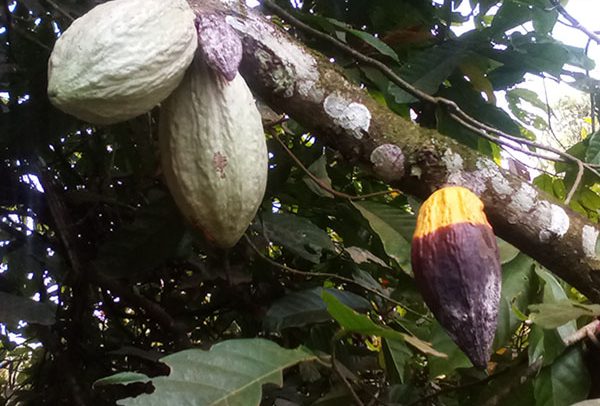Some affected cocoa trees
The Ghana Cocoa Board (COCOBOD) is undertaking an exercise to cut down all swollen shoot affected cocoa trees in the Western North Region to help prevent the spread of the viral disease in the area.
The move, termed ‘Cocoa Rehabilitation Programme’, is to eradicate the disease to ensure a boost in cocoa production in the region.
It is also to allow the planting of new and high-yielding seedlings to replace the destroyed trees.
The Western North Region, which used to produce about one-third of the nation’s annual output, is now a shadow of itself due to the devastation caused by the Cocoa Swollen Shoot Virus Disease (CSSVD).
The situation is having a serious effect on the national output.
The entire Western North cocoa region covers an area of over 500,000 hectares; and a nationwide survey conducted revealed that 42 per cent of the tree stocks in the region were diseased.
It was revealed that a break in the implementation of the rehabilitation programme between 2014 and 2017 led to the massive outbreak of the disease.
This came to light when some journalists visited some of the diseased and rehabilitated farms in the Western North Region.
Mr Kwame Owusu-Ansah, Western North Regional Manager, Cocoa Health and Extension of COCOBOD, revealed that a survey was recently conducted on 225, 953.92 hectares of cocoa farms in the region.
He said the results revealed that 156,114.4 hectares, representing 69.09 per cent were diseased and therefore unproductive.
He said so far, 10,205.52 hectares of the spotted diseased farms had been treated and planted with the new cocoa seedlings and plantain suckers to serve as shades for the cocoa.
“About 6,205 farmers were affected out of which 5,603 have been fully compensated,” he said.
He said the next phase of the rehabilitation programme which would start on August, 17, 2020 was expected to cover an area of 20,126 hectares.
Jobs Created
He revealed that about 4,500 jobs had been created for the youth in the beneficiary communities who had been engaged to support the programme with weeding.
“456 diseases spotters and 138 technical assistants (TAs) have also been engaged,” he said.
He said the current programme was being funded by part of the US$600 million syndicated loan facility granted by the consortium of Development Finance Institutions (DFIs), led by the African Development Bank (AfDB).
He believed that the initiative would help alleviate poverty by increasing productivity and promoting a progressive and sustainable cocoa economy.
All hope is not lost. With the current measures, coupled with the support of farmers and other stakeholders, Ghana’s cocoa industry is on the verge of a massive rejuvenation,” he stated.
From Emmanuel Opoku, Sefwi Wiawso


